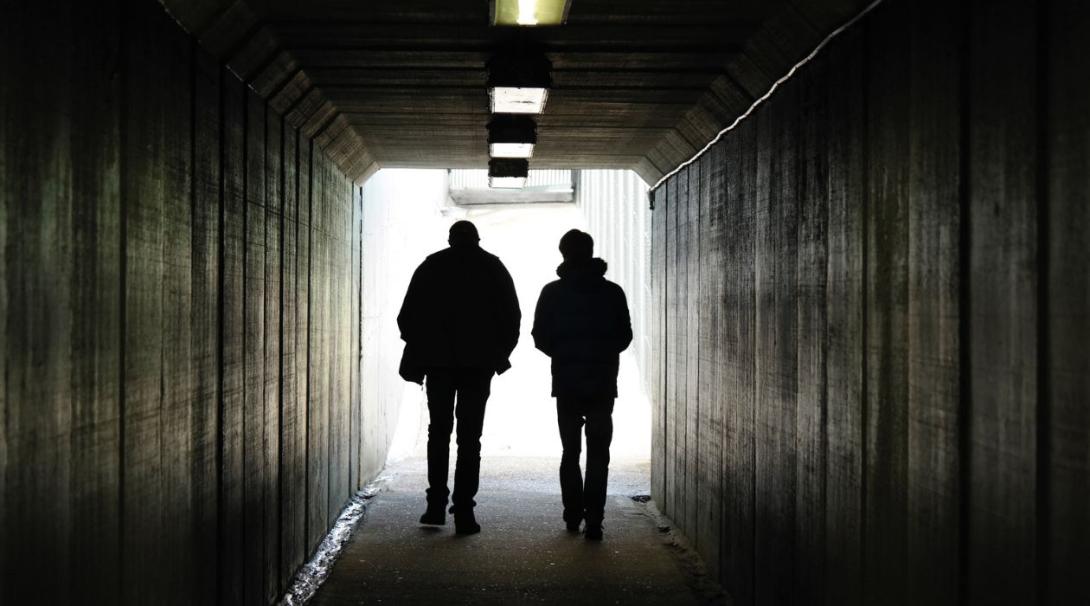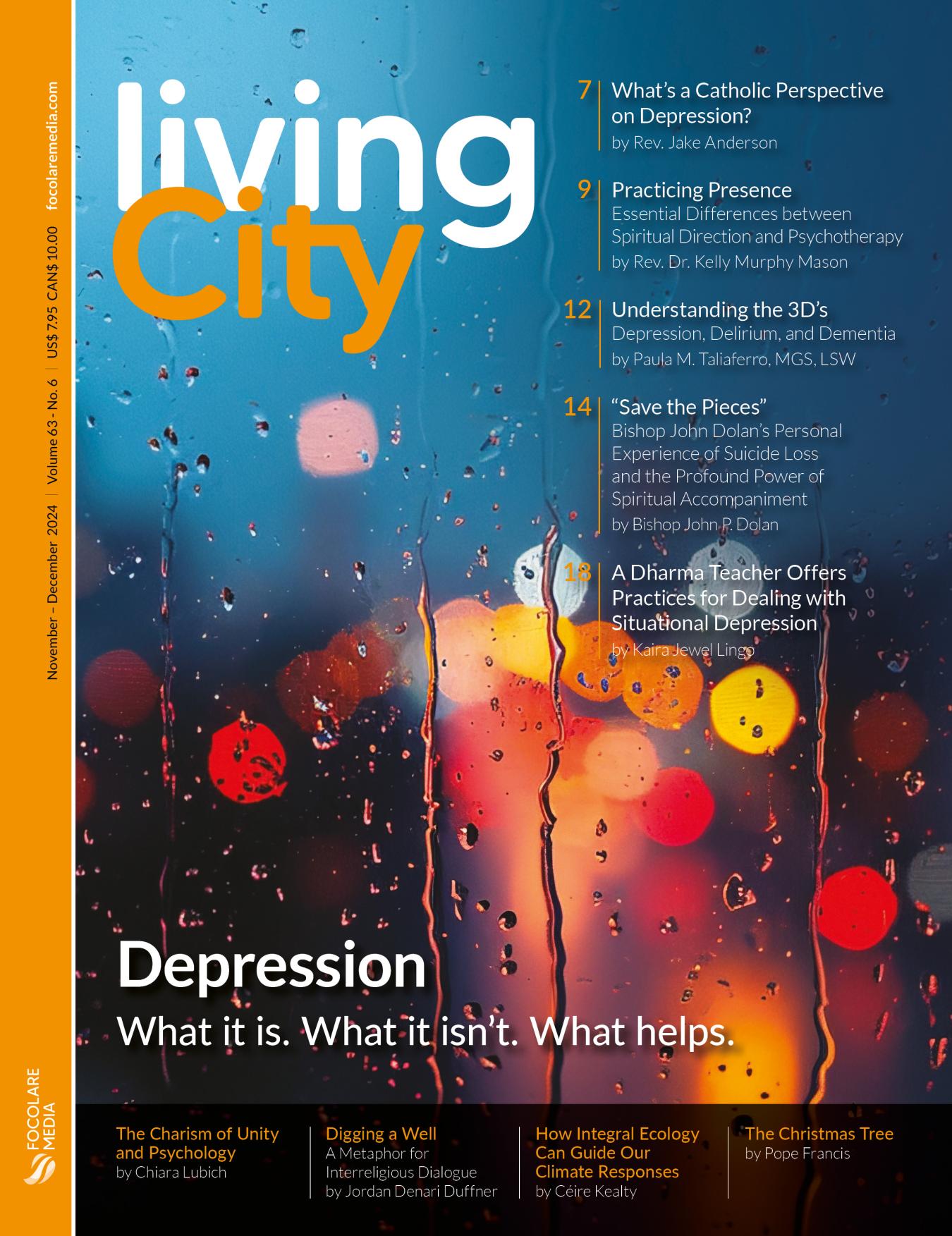Bishop John Dolan’s Personal Experience of Suicide Loss and the Profound Power of Spiritual Accompaniment

Photo by Rene Van Den Berg | Dreamstime.com
An abundance of flowers filled our living room, the refrigerator was stacked with homemade casseroles from friends and neighbors, and kind words of condolence were spoken. After my brother Tom died by suicide, there was an outpouring of support from the community, which got us through those initial hard days.
I was just about to start eighth grade as my parents, seven other siblings and I went through this profound loss. In those first months after the funeral, there was a lot of what I call “incidental accompaniment”—people would share a kind word or gesture, “we are praying for you” and “our hearts go out to you,” but it was often one-time or in passing. After all, people don’t usually know what to say to someone who has lost a loved one by suicide.
Slowly, though these kind words continued to be shared, it seemed like the lives of everyone around us started to get back to normal, while our family would never be the same. It was in this time of my life that I first experienced the profound impact of intentional spiritual accompaniment.
There was a Franciscan religious sister named Sr. Mary Kiely, OSF, and I first met her when I was in second grade, and she was teaching in a nearby classroom. She encountered us Dolan kids at the local Catholic school throughout the years and eventually became the parish youth minister. She knew us very well. I think religious sisters have a unique gift for not letting people fall through the cracks, and Sr. Mary Kiely sought me out.
She was very intentional spending one-on-one time with me, fostering a space where I could tell my story and express my heart, my questions, and concerns, like my worry about if my brother Tom was in heaven. She would share Scripture verses that we would ponder together, like Sirach chapter 2 about clinging to the Lord in trials and trusting in him who is refining us like gold in the fire. She would also offer advice, but only after much listening.
Sr. Mary Kiely’s devoted accompaniment over many seasons and years of my life showed me that I am not a puzzle to be solved or an issue to be fixed, but that together we could sit and ponder the mysteries of the Lord and how he is intentionally working in my life.
Sr. Mary Kiely showed up, she walked with me, and created a space for me to come as I am and unfold and grow into who the Lord was forming me to be. Such accompaniment was an anchor in my life when, several years after Tom’s death, my sister Therese and brother-in-law Joe both died by suicide, and again when my sister Mary died by suicide just two years ago.
With each loss, her “walking with” became even more intentional. Sr. Mary Kiely continued praying for me throughout my years of seminary, writing letters, and sending articles by theologians who she thought would help me in my formation. It was only fitting that when I was installed as Auxiliary Bishop of San Diego in 2017, she read the First Reading at the installation Mass—Sirach chapter 2.
Sr. Mary Kiely showed up, she walked with me, and created a space for me to come as I am and unfold and grow into who the Lord was forming me to be.
In his general audience in January 2023, Pope Francis spoke about this sort of accompaniment that Sr. Mary Kiely lived out so well. He said, “He or she who accompanies does not substitute the Lord, does not do the work in place of the person accompanied, but walks alongside him or her, encouraging them to interpret what is stirring in their heart, that quintessential place where the Lord speaks.”
He went on to share that more than the term “spiritual director,” he prefers the term “spiritual accompanier.” I love that! And I think Chiara Lubich, who founded the Focolare Movement on a deep sense of unity would love it too. When we journey together, especially through the sufferings of life, the other can draw our attention to the things that perhaps we can’t see on our own.
This quite simple yet profound response of accompaniment in the face of loss and suffering doesn’t always come easily to us in our human brokenness. Especially in the case of suicide, we often default to certain judgements and tend to respond in ways that make us feel safe or comfortable. Even people of good will, when they hear about someone who died by suicide, often jump to conclusions such as Oh, well they are in hell now, and assumptions such as They probably weren’t praying enough, or It’s because they stopped going to church.
As human beings we try to make sense of it all and, in a way, we try to fill the gaps of the story. Intentional accompaniment is not about judging the situation or filling the gaps, but about turning to the Church for guidance as we turn to the other who is right beside us as a “spiritual accompanier.”
In the case of suicide, the Church teaches that the taking of one’s life is always a grave matter. But the Church does not presume subjective culpability or the eternal destination of those who have died by suicide. The Catechism of the Catholic Church acknowledges that “grave psychological disturbances, anguish, or grave fear of hardship, suffering, or torture can diminish the responsibility of the one committing suicide” (2282). Therefore, not only can we hope, but we are called to hope on behalf of those who have died by suicide. As the Catechism continues, “we should not despair of the eternal salvation of persons who have taken their own lives. By ways known to him alone, God can provide the opportunity for salutary repentance. The Church prays for persons who have taken their own lives” (2283).
Developments in the behavioral sciences, as well as the Church’s own experience of accompanying families affected by the tragedy of suicide through pastoral outreach have, following the guidance of the Holy Spirit, assisted the Church in coming to this more mature and complete understanding of suicide loss and mental illness. And yet, even when we know these truths and teachings, it can still feel so hard to accompany another who has experienced suicide loss or suffering of any form. Again, we revert to questions such as, What am I supposed to say? How am I supposed to fix it?
But what if accompaniment isn’t about fixing at all? It reminds me of a saying my mom used to repeat when we were growing up: “Save the pieces.” As you can imagine, in a family home with nine children, the occasional dish would break, and my mom used to say, “Save the pieces.” It took me many years to realized that, perhaps, this was her prayer to God about us, her children, who had experienced so much suffering.
Accompaniment is not so much about putting the pieces back together—that’s the work of God; that’s why we need a Savior, after all. But rather, it’s about recognizing that these broken pieces, no matter how shattered, hold immense value and inherent dignity, and we have the honor of holding space for the other as they experience, sift through, and ponder the mystery of their own broken pieces. This is the starting place of spiritual accompaniment.
When we hold this space for one another, simply by showing up, listening intently, and walking with, abundant fruit is born. We have seen this firsthand in the Diocese of Phoenix, where I serve as bishop. In December 2022, I had the immense privilege of founding the Office of Mental Health Ministry, one of the first of its kind not only in the US, but in the global Church.
Accompaniment is not so much about putting the pieces back together—that’s the work of God; that’s why we need a Savior, after all. But rather, it’s about recognizing that these broken pieces, no matter how shattered, hold immense value and inherent dignity.
Since then, nineteen parishes in our diocese have begun the process of establishing some form of mental health accompaniment—featuring a space called The Well where individuals can gather and share their stories. More than 600 individuals, including religious sisters, deacons and their wives, priests, parish mental health ministry teams, lay people, the staff at our Diocesan Pastoral Center and others who are concerned about mental health have received Adult Mental Health First Aid Training, and some school staff members have been trained in Youth Mental Health.
We are also about to begin a pilot program in partnership with Catholic Charities and our Catholic Schools Office, which will provide wraparound services, including mental health resources and support, to six of our elementary schools and two of our high schools where financial resources may not be robust enough for the communities to do this on their own. But most importantly, the Office of Mental Health Ministry, which is founded on the three pillars of accompaniment, education, and advocacy, has given individuals permission to simply share their stories of deep suffering, including suicide loss, maybe for the first time in their lives.
After our first annual Mass of Remembrance for those who have died by suicide, which took place in September 2022, a brother priest shared that until that Mass, he had never been able to speak about the death of his father by suicide outside of his family—he had been afraid, not only because of the stigma around mental illness, but also that formators would not allow him to enter seminary because of his father’s suicide. It was a life-altering moment for him.
During this first Mass of Remembrance, we also invited everyone in the Diocese of Phoenix to submit the names of their loved ones who have died by suicide so that we could remember and honor them in a special way during the liturgy. I was expecting we would receive around 150 names—we received more than 1,200.
It was deeply impactful to watch hundreds of individuals process to the front of the church, presenting a carnation in honor of each of their loved ones before an enormous image of Our Lady of Guadalupe, the patroness of our diocese and a mother to each one of us. The names of all loved ones who have died by suicide were also written in a book that was present during the Mass and has been added to annually. Every year, the Mass of Remembrance is a beautiful experience for all present to see that they are not alone, that the Church is here for them in their suffering, and we have one another.
The more we share our own stories and experiences—holding space for the broken pieces of others and allowing them to hold space for us—spiritual accompaniment can flourish. “For where two or three are gathered together in my name, there am I in the midst of them” (Matthew 18:20).
The more we share our own stories and experiences—holding space for the broken pieces of others and allowing them to hold space for us—spiritual accompaniment can flourish.
I invite you to ponder the following questions: When I hear of someone else’s suffering, what is my automatic reaction? Do I run toward them or away from them? What judgements and assumptions do I make?
Am I willing to be a space for others to come as they are and to unfold, without trying to fill the gaps in their story? Am I willing to admit that I’m made of broken pieces, too?
In what ways do I need accompaniment in my own life, and how is the Holy Spirit inspiring me to reach out to others for help? Who in my life am I being called to spiritually accompany?
If Sr. Mary Kiely were here, she would remind you that you are worth the effort of these questions, and that you have a community who would delight in accompanying you through them. She’d also tell you that flowers are great, and so are casseroles, but nothing can compare to the gift of your presence.
If you enjoyed this article, you might like...













